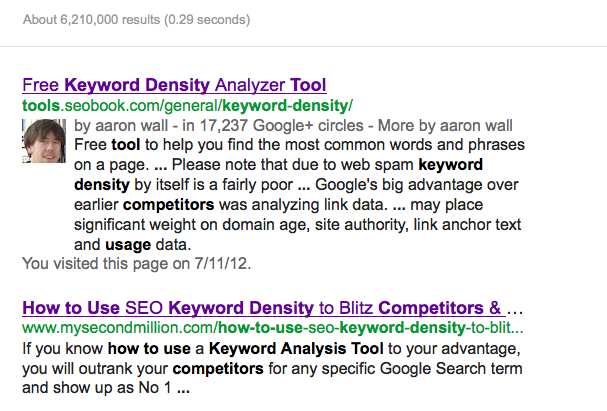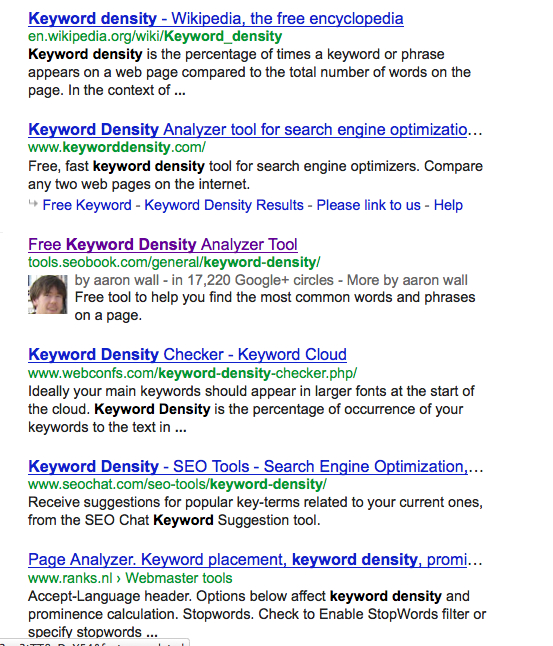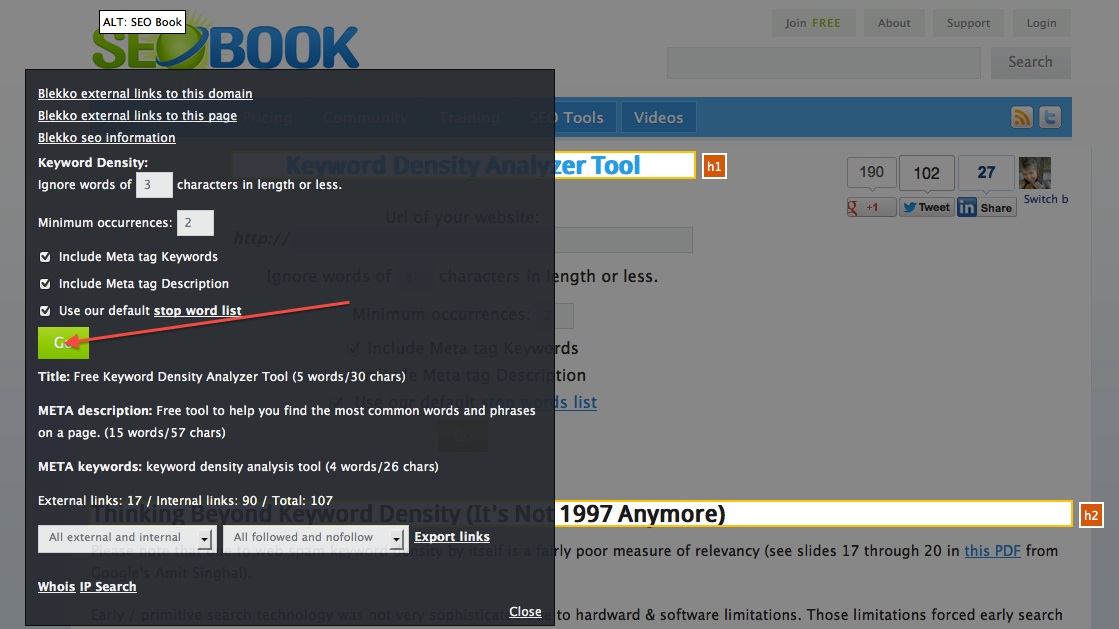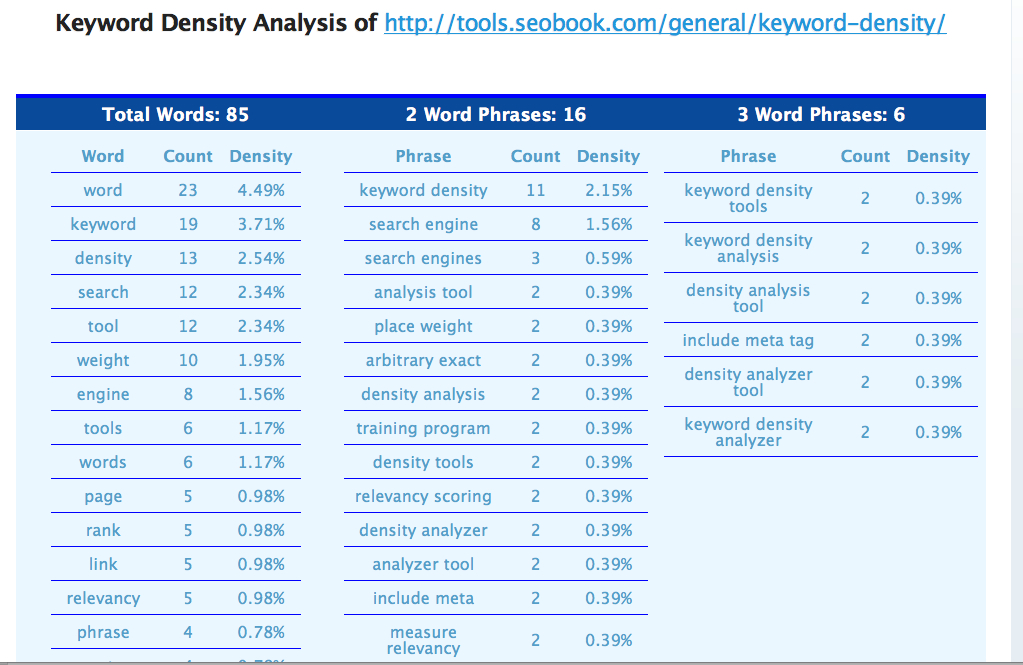 One of the best SEO secret weapons is The Keyword Density Analyzer Tool. If you know how to use a Keyword Analysis Tool to your advantage, you will outrank your competitors for any specific Google Search term and show up as No 1 on Page 1 of the Google Search Engine Results Page (SERP). And that is every entrepreneur blogger’s goal. Why? Because that highly prized No 1 top position is guaranteed to attract lots of lovely traffic to our website, and traffic = money in the online world of blogging.
One of the best SEO secret weapons is The Keyword Density Analyzer Tool. If you know how to use a Keyword Analysis Tool to your advantage, you will outrank your competitors for any specific Google Search term and show up as No 1 on Page 1 of the Google Search Engine Results Page (SERP). And that is every entrepreneur blogger’s goal. Why? Because that highly prized No 1 top position is guaranteed to attract lots of lovely traffic to our website, and traffic = money in the online world of blogging.
What is Keyword Density?
Keyword Density is the number of times a word or phrase is used in a piece of writing, divided by the total number of words of the article, and expressed as a percentage. For example, if a specific word occurs 10 times in an article that is 500 words long, the keyword density for that word would be 10 divided by 500 x 100 = 2%.
Keyword Density Analysis is one part of what’s called SEO On Page optimisation. Search Engine Optimization (SEO) is broadly divided into
On Page SEO – the contents and organization of your own website – and
Off Page SEO which is all the promoting you do outside your own website.
You only have to do the basic things well, to be good at Search Engine Optimization (SEO). You don’t have to perfect, or have fancy skills. You don’t have to be an expert or have studied SEO for years. You can do a good job optimizing your content with a few simple steps, once you know how.
How to Use Keyword Density Analyzer To Your SEO Advantage
In order to write articles with the best optimized keyword SEO, we need to be able to analyze our own use of key words, and also how our competitors are using key words in their articles. Our aim is to optimise our own content to match, or out-do, our competitors in the eyes of the Google web crawlers.
Google is impressed by numbers – among other things. And we have to impress the Google web crawlers – because that is how Google collects, analyzes and ranks our content against the content of other websites. If our articles don’t rank well, they will be buried deep around page 103 of a Google search result, and no one will ever know they are there.
There are plenty of free Keyword Density Tool Analyzers available online. However, if you have already installed the you-beaut Free SEOBook Toolbar (see Install the Best Free SEO Toolbar) you already have a great Free Key word Density Tool, right there at the top of your computer screen. If you haven’t installed the Free SEObook Toolbar, you can get it here:
Once you’ve installed your SEO tool bar, you will be able to use the SEO Xray keyword tool.
The Free SEO XRay Tool
This Free SEO Xray tool provides us with a lot of useful information. In fact, it’s amazingly useful – and loads of fun. It’s part of what you get with the free SEObook Toolbar – a toolbar that’s made and promoted by my new mate, the Big Cheese of SEO, Aaron Wall (Hi, Aaron!).
The SEO Xray tool is situated towards the right hand end of the toolbar:
We can use this SEO Xray keyword tool to
1. Check our competitor’s use of Keywords,
2. Check the key word density of individual words and phrases our competitors have included in their successfully optimized content.
We know our competitors have successfully optimised their content if Google gives them a top placement in the Google Search Results Pages (SERPS). So all we need to do to find our top competitors, is to do a simple Google search for the topic of our article, and see who Google has placed in the first few slots of Google Page1 results.
3. We can look for relevant keywords or keyword phrases that our competitors have used, but keywords we might not have thought of, in our own research. Then, perhaps we can use those keywords in our own article – but only if those key words are relevant to the topic we are writing about.
With all this data, we can compare their SEO data to our own. Then we know how our use of Keywords stacks up against theirs. And if our results are woeful by comparison, we can set about improving our use of keywords, and compete effectively for the top spot on Google search engine results. Here’s step by step Guide on how to do it:
Do a standard Google Search for your Topic
In this case of writing this article, I typed in ‘Keyword Density’. This is what I got:
The 3rd article down is by Aaron Wall himself, and it’s for an article exactly on Keyword Density! This would be a great article to investigate to check out his keyword SEO…… and see how well he’s done with his search engine optimization.
When the website page has loaded, click on the SEO XRay icon in the tool bar and you see this:
There’s lots of useful info there, but in this article we are focusing on Keyword Density. The Keyword Density Tool is on the top left of the black background Xray you can see. Click on the ‘Go’ tab (red arrow above). This is what you will get:
You will see the SEObook article’s Key word Density for
- One Word,
- 2 Word Phrases and
- 3 Word Phrases – these are their potential Long Tail keyword terms.
Not sure what a Long Tail Keyword search is? Check out this article: Keyword Research Tool part1
What to Look For In Competitor’s Keyword Data
Check their keyword density stats for:
- Which keywords have the highest keyword density
- what that density is (a percentage)
- Have they used the same or similar keywords to the keywords you plan to focus on in your article?
- Are there other high density words or phrases that you missed in your research, and think you could seamlessly include in your written copy?
- Do these keywords have high Global Searches and low Competition in the Google Keyword Research Tool?
If you see some potentially useful keywords or phrases that you’ve missed in your research, do a quick check in the Google Research Tool to see if they have High Global Searches, and lowish competition. If so, snaffle them right now for your own article!
If you want to, you can repeat this competitor keyword check for a couple more of those Page 1 Google results if you want to. It’s quite interesting to do, but you should not get lost in research, and never get around to writing your article! Once you’ve done this process a few times, you will know what the keyword stats of a ‘well optimized’ article look like. Then you will be able to use the Keyword Density tool quickly in order to quickly check and compare your own work against the best, and make sure you are doing OK.
Write Your Article
Armed with all this keyword information, you can now write your article. It’s important that, to some extent, you forget the exact data results you’ve just unearthed. This is because you must write your article naturally, putting in all the important facts and information into it, in a readable style. However, because our heads are now full of what we know are the good keywords we want to emphasize, we will naturally write content that includes these keywords. The result is that your writing will now naturally tend to include the important Keywords (relevant, high searches, and low competition) because we know what they are.
Hmmm….. I seem to have a lot still to say on how to write your articles from a Keyword Density and SEO point of view. But….ever-thoughtful as I am :), and ever-mindful of my lovely reader’s precious attention span (and my need to do the shopping) I will continue this topic in the next article……How to Use SEO & Keyword Density Tools to Write Articles
Update: Now, I don’t like to brag (would I lie to you?) but….a Google search today for Keyword Density Analyzer Tools gave me …..
 OK, Aaron, the Big Cheese of SEO is still in the top spot but….he he!
OK, Aaron, the Big Cheese of SEO is still in the top spot but….he he!





Hey there this is kinda of off topic but I was wanting to know if blogs use WYSIWYG editors or if you have
to manually code with HTML. I’m starting a blog soon but have no coding know-how so I wanted to get guidance from someone with experience. Any help would be greatly appreciated!
You don’t need to know anything about HTML coding to set up a WordPress blog or website. When you want to write a new article, you just type directly into the text box that appears when you click on ‘Add New Post’ in your WordPress Dashboard.
The WordPress installation is one-click automatic using Fantastico that comes with your Hosting Account – I use and recommend Hostgator for Hosting – see the special offer Hostgator 1Cent deal Coupon in the right hand sidebar.
You either use the default theme that comes with your WordPress installation, or choose a new one from WordPress – either a free one or a Premium theme which costs money – I use the free Weaver theme.
For people who don’t know, WYSIWYG is the acronym for What You See Is What You Get – which pretty much says it all – you type, and you see, without any need of HTML coding knowledge.
If you click on the Category: ‘How to Set Up a Blog’ in the right hand sidebar, or in the Sitemap along the top of this page, you will see everything you need to know about how to get started with a blog or website.
Good luck – it’s great fun!
Carol.
A colleague recommended me to your resource.
Thnx for the details.
No worries, brent. When I was starting out with blogging, I found that many articles explaining how to do stuff, missed out the details. It’s the details where most people get stuck. I always try to include every detail that I can.
Carol.
Howdy! I know this is kind of off-topic however I needed to ask.
Does operating a well-established website such
as yours take a lot of work? I am brand new to blogging but I do write in my diary every day.
I’d like to start a blog so I will be able to share my own experience and views online. Please let me know if you have any kind of recommendations or tips for brand new aspiring blog owners. Appreciate it!
Hi there, a lot depends on what sort of blog you want to set up. The job of buying the Domain Name, getting a Hosting Account, and downloading and installing WordPress, can be done in a couple of hours – or less if you know what you’re doing!
If you just want to keep an online diary and share your thoughts and experiences with friends and family, that would take almost no work at all. You could write as much or as little content as you wanted, and your friends will know to go there to read what you write etc
If you want to reach a wider audience, or make money from your blog, it will take more work. If that is what you want to do, you have to learn how to impress Google enough that your articles get listed high up in Google Search results.
If you don’t rank well in Google results, and only appear buried deep at about Page 90 of results, no one (other than your friends) will know your blog even exists.
This is a big subject, and what this whole blog is about. If you check out the Category ‘How to Set Up a Blog’ in the right hand sidebar or via the Search box at the top of the page, you will see about 17 articles on the basics of blogging
It’s a good place for Beginners to start, because when I started blogging in Jan this year, I knew almost nothing about it.
But every time I learned something new, I wrote an article about it – while I still remembered all the snags and hiccups I tripped over as I found out how it was done. Now, that Category is a collection of Guides for Beginners which is pretty much in chronological order of what you need to know when you start out.
I was silly enough to start out with TWO blogs at the same time when I knew nothing about anything (don’t ask, it was complicated!) and that was a lot of work. It’s true I spend all day (and long days) working on my blogs in various ways, but one blog would be much less work.
As well as publishing high content articles a couple of times a week (at least), there is always a long list of things I still need to work out how to do. That takes time, and also you need to spend time getting backlinks from other websites, and make comments on other websites to get lots of links back to your blog sprinkled across the internet.
You don’t need to do any of those things if you do not aim to build up a big readership for your blog.
Also, if I’m ever going to make it to my Second Million, I have to build up a blog that attracts thousands of people wanting to throw money at me – but I’m working on it. 🙂
The main thing is this: if you want to start a blog – just DO IT!. Take action. Get a blog going and then see how much time you want to spend on it. Only you know what you want to achieve with your blog.
Good luck with it.
Carol
Try to make a list of all the key words in an article before you write it, then make sure you utilize them several times. This makes sure that you reach the right key word density and also makes sure your article is on the right topic and makes sense.
You’ve got the right idea Aditya, but don’t forget to write your article in a natural way. This use of keywords must not be noticeable to readers. If your article does not feel as if a human wrote it without knowing what the keywords are, Google can notice too, and penalize you for keyword stuffing.
Very nice blog and info thank you for share it.
I didn’t understand the need to check competitor keyword density…He might be doing something wrong and this might affect our ranking… I need help on this because i am in the custom essay writing industry and it is highly competitive…
Hi, I see that your site is dealing with Essay writing and Thesis writing. Keyword density is not relevant to that sort of writing – in any way.
Keyword density is only a way that you can try to influence and ‘impress’ Google web-bots, and the other web crawlers, and make them select your online articles, and give you a higher Rank against other competing website.
Competing against the written content of other websites is what you have to do, if you want your articles to get high Google Rank, and high listing in Google Search results.
If you are not interested in getting your written articles appearing on Page 1 of Google Search Results, then Keyword Density is irrelevant for you – so don’t worry about it.
If you are writing Theses and Essays, you should ignore the whole idea of Keyword Density – it doesn’t apply for you.
Pingback: Backlinks, Authority, Page Rank & Traffic: How To Get Them!
Pingback: Write Top Rank Articles Using Power SEO & Smart Keywords
Pingback: SEO Tutorial: Get The Best Free SEO Optimization Toolbar
Pingback: Brilliant CuteRank Keyword Check Tool - It’s Cute & It's FREE
Pingback: SEO Tool Accuracy Research: Link-Type Analysis & Keyword Density
Pingback: How Often Must You Post New Articles to Build Traffic & High Rank?